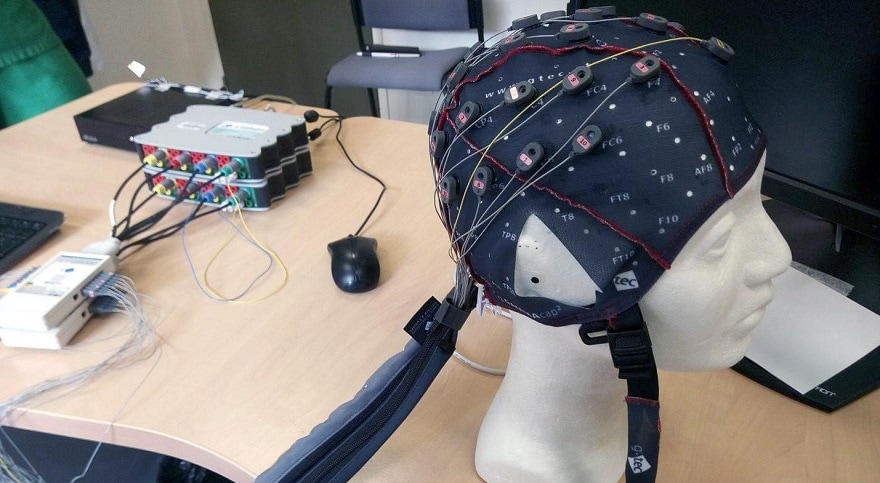At a time when digital technology is shaking up the world of healthcare, researchers, engineers and companies are working together in Nantes on joint projects to design concrete solutions resulting from digital developments. One of their projects, a thought-driven avatar, is creating real opportunities to improve healthcare provision and meet the health challenges of tomorrow.
L’he contribution of digital technologies in the evolution of therapeutic approaches is a major issue in the health sector. In Nantes, the CHU, the Ecole Centrale and the company Onepoint have been working together for a year on a thought-driven avatar project.
By combining BCI (brain-computer interfaces), artificial intelligence and design thinking, they have developed a system that allows the brain activity of a person to be analysed by means of an electro-encephalographic helmet, and to interpret his or her "movement intentions" by retranscribing them thanks to a virtual avatar, which is of real therapeutic interest.
There are many applications, particularly in the treatment of phantom pain following amputation or damage to the nervous system, or in the management of disabilities. “This experiment is of interest to neuroscience researchers at the Nantes University Hospital because it makes it possible to study the speed of rehabilitation and the acceptance of treatments by patients, and even to propose therapeutic exercises to people suffering from neurological disorders", explains Doctor Vincent Roualdes, neurosurgeon at the Nantes University Hospital.
"After an initial collaboration around a thought-driven drone, the idea for this therapeutic project emerged during the fourth edition of Nantes Digital Week in 2017. We have been working on its development since January and we hope to set up the first clinical trials on patients within three months. This will be a first in France, because this time we will go far beyond a use that allows simple image analysis by offering a concrete application in terms of care", says Sébastien Ravoux, head of Technical Expertise at Onepoint.
An innovative way of "re-training" the brain by guiding through targeted training its plasticity to "repair" itself when it is still possible or to pilot connected objects or prostheses to overcome motor handicaps (learning to pilot will be done thanks to these virtual reality systems), according to Dr Roualdes.
The first trials conducted by the team have been conclusive, and clinical trials are expected to begin as early as 2019.
Non-definitive version of what will be presented at Nantes DigitalWeek 2018
An avatar against schizophrenia
To help patients with mental health problems, psychoanalysts around the world had already been turning to virtual reality and avatar therapy for several years.
In 2015, using virtual reality, patients with schizophrenia were brought to face their computer-built demons to drive them out of their lives, in a pilot project at the Institut Philippe-Pinel de Montréal, by psychiatrist and researcher Alexandre Dumais.
Inspired by a British study conducted five years earlier, Dr. Dumais was determined to find a way to reduce auditory hallucinations that were resistant to treatment. He believed the key was to establish a dialogue between the patient and his demon. The demon was therefore entrusted to a computer technician, who reproduced it by computer. With a virtual reality headset, the patient finds himself in a face-to-face encounter with the entity that is persecuting him. It is the psychiatrist who makes the avatar speak by reading a list of words that the patient is used to hearing in his head. Everything is scripted and perfectly framed.
"It worked in Britain, it works here too. These are significant results, says the researcher, already dreaming of the day when psychiatric clinics will be able to use the avatar method to treat all people with schizophrenia. (Source : Radio Canada 2017)
The Nantes Digital Week
The new project in Nantes - and the way it is being conducted collectively by three players with varied and complementary skills - illustrates the synergies and very concrete proposals that can emerge during Nantes Digital Week.
Co-constructed by the actors of the territory, this "week of all digital cultures" has been aiming for five years now to bring together each year for ten days multiple types of actors to encourage reflection, exploration and cooperation.
Among the many proposals received this year, "health and digital" is one of the flagship themes that emerged from the contributions. A trend that is particularly echoed in the Nantes metropolitan area, a member of the "Health Tech" network and a territory that is very active in the field of e-health with the recent award of the "Health Tech" label. of the I-Site project and the opening, by 2025, of a genuine "health district" around the future CHU of Nantes.
Nantes Digital Week from 13 to 23 September 2018.

Header photo: bci helmet - Onepoint Group
Anything to add? Say it as a comment.












